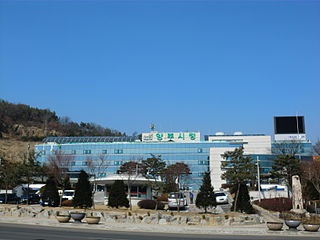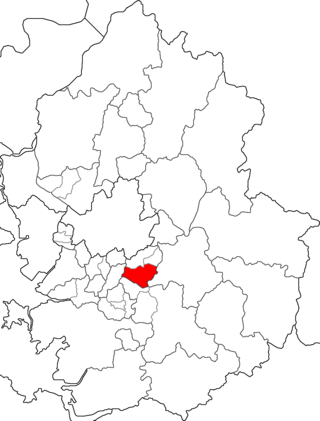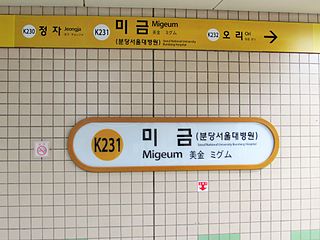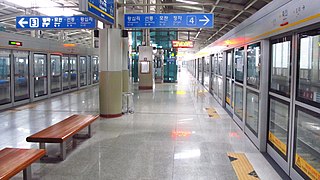
Yongin is a city in the Seoul Capital Area, the largest in Gyeonggi Province, South Korea. With a population over 1 million, the city has developed rapidly since the 21st century, recording the highest population growth of any city in the country. Yongin is home to Everland and Caribbean Bay, South Korea's most popular amusement and water parks. The city is also home to the Korean Folk Village, the largest of its kind. Yongin is a multi-nuclear city with multiple urban centers, not a single nuclear structure, and Giheung District crosses the Yeongdong Expressway and Dongbaek, while Suji District crosses Pungdeokcheon Stream and Jukjeon.

Anseong is a city in Gyeonggi Province, South Korea, 80 kilometres (50 mi) south of Seoul. Its geographical location is 37°0′N127°16′E.

Seongnam is the fourth largest city in South Korea's Gyeonggi Province after Suwon and the 10th largest city in the country. Its population is approximately one million. It consists of three administrative districts: Bundang District, Jungwon District, and Sujeong District.

Yangju is a city in Gyeonggi Province, South Korea. Yangju is located south of Dongducheon and north of Uijeongbu, not far from Seoul.

The Shinbundang Line Korean: 신분당선; Hanja: 新盆唐線; literally, New Bundang Line) or DX Line for Dynamic Express Line is a 33.4 km (20.8 mi) long line of the Seoul Metropolitan Subway. It is the world's fifth subway to run completely driverless and the second completely driverless metro line to open in South Korea, after Busan Subway Line 4. It connects Sinsa station and Gwanggyo station in 42 minutes, a feat achieved by being the first line to operate South Korea's next-generation subway car travelling at over 90 km/h (56 mph), with the fastest average speed of any subway line in the country.

Bundang District is the largest and most populous district (gu) of Seongnam, a major city in the Seoul Capital Area, South Korea. Bundang District is one of South Korea's wealthiest and highest developed areas, being the nation's first and largest completely artificial city built in the early 1990s. Many high-rise luxury condos moved in the early 2000s, with a second planned city built in the late 2000s called Pangyo in the same district. Apartment prices are the second highest in Gyeonggi Province after Gwacheon and 7th highest nationwide, higher than many central Seoul districts such as Mapo District or Jongno District. Apartments around Pangyo station and the high-rise luxury condos around Jeongja station and Sunae station rival prices in the most expensive areas in the country. Unlike older cities such as Seoul, Bundang has no telephone poles overground, resulting in a clean cityscape with well-designed streets.

Apgujeong-dong is a ward of Gangnam District in Seoul, South Korea. It is considered one of the wealthiest neighborhoods in South Korea. It was reported that housing price of Apgujeong-dong is approximately US$28,300 per one square meter by Korea Ministry of Land, Infrastructure and Transport in 2019.

Tancheon is a stream in Gyeonggi Province and Seoul, South Korea. The stream is a tributary of the Han River. It begins in Yongin, Gyeonggi Province, flows through Seongnam, and eventually into the Han. It has a total length of 32.66 km (20.29 mi).

Migeum Station is a subway station located in Geumgok-dong. It is between Jeongja Station and Ori Station on the Suin–Bundang Line. It became a transfer station to the Shinbundang Line in April 2018.

Seongsu Station is a rapid transit station on Seoul Subway Line 2. It is located in Seongsu-dong in the Seongdong-gu administrative district of Seoul. It is also the southeastern terminus of Line 2's Seongsu Branch to Sinseol-dong. Trains needing to be serviced take the Seongsu Branch from this station and go to the Gunja Train Depot behind Yongdap Station.

Jukjeon Station is a station on the Suin–Bundang Line, located in Jukjeon-dong of Suji-gu, Yongin. It opened on Christmas Eve in 2007 and plays a crucial role in relieving the traffic congestion of the northwestern part of Yongin. It is also the closest station to the Yongin campus of Dankook University, with shuttle buses expected to run between the university and the station.

Samseong-Dong is an affluent neighborhood or ward of Gangnam-gu in Seoul, South Korea.

Suji District, or Suji, is one of the three city districts in Yongin, South Korea which is approximately 29 km south of Seoul. Suji became a city district on October 31, 2005, about nine years after Yongin officially became a city. When Yongin was established in 1996, both urban and rural areas were covered to become a part of the city; thus to this day, Yongin's urbanization is varied throughout different regions of the city. Suji is one of the most urbanized areas of Yongin, as it borders Seongnam's Bundang District and Suwon, two more well developed areas. Home to the newly built Shinsegae Department Store and Dankook University in one of its towns, Jukjeon, Suji is rapidly developing as Yongin becomes more and more urbanized. In recent years, the district has attracted upper-class Koreans, with the completion of the Samsung East Palace in 2010.

Jukjeon-dong is a dong in Suji-gu of Yongin city. Jukjeon was divided into Jukjeon 1-dong and Jukjeon 2-dong on December 24, 2001, when Suji-eup was promoted into Suji-gu. Jukjeon borders Seongnam city to the north, Mohyeon-Eup of Cheoin-gu to the east, and Giheung-gu to the south. Tancheon flows through the neighborhood, with west of the stream classified as Jukjeon 1-dong and the east of it classified as Jukjeon 2-dong. Jeongpyeongcheon, a stream, also flows into Tancheon at Jukjeon. Along the banks of Tancheon are small parks and paths for walkers and cyclists.

Giheung Station is a subway station of the Suin–Bundang Line and the EverLine, in the city of Yongin, Gyeonggi Province.
Dongcheon-dong is a dong located in Suji-gu, Yongin, South Korea. In 2010, it was home to around 31,000 individuals.

Suji-gu office Station is a metro station located in Pungdeokcheon-dong, Suji-gu, Yongin, Gyeonggi-do, South Korea. The station is decorated with a holographic aquarium.

Seongbok Station is a metro station located in Seongbok-dong, Suji-gu, Yongin, Gyeonggi-do, South Korea. The station has a popular cafe street and shopping mall called Day Park directly in front of Exit 4.

Sanghyeon Station is a metro station located in Sanghyeon-dong, Suji-gu, Yongin, Gyeonggi-do, South Korea. The station's floors are decorated with LCD screens displaying water ripples and fish that interact with people's footsteps, symbolic of the popular Gwanggyo lake park that is located 10 minutes by foot from this station.

GwanggyoJungang Station is a major metro station located in Gwanggyo, Yeongtong-gu, Suwon, Gyeonggi-do, South Korea. Jungang means "center" in Korean, denoting the station's central location in Gwanggyo. The station is close to Ajou University and its hospital.




















